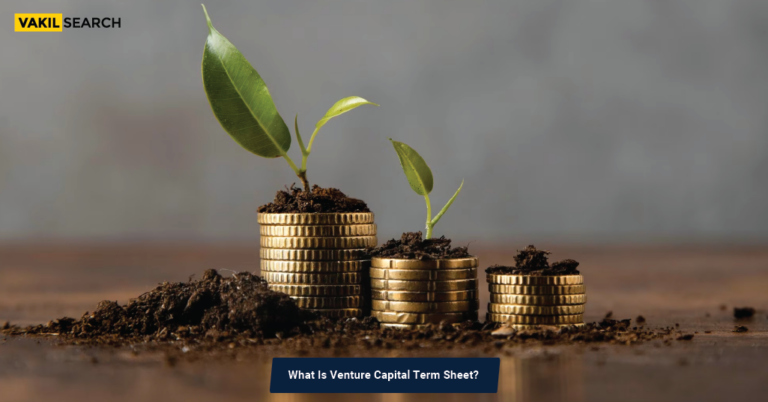Interested in knowing about Term Sheet? Well, you are at the right place. Here we will take a look at term sheets and how they change as financing and funding rounds evolve.
For a founder or a business owner finding capital for a firm can be difficult. However, the fundraising world has its own set of language and standard paperwork to ease this out. The ‘term sheet’ is one such document that serves as the foundation for formal legal papers. The document ensures that you comprehend what it reads so that any objection to any terms can be resolved. An investment term sheet is essentially a list of the conditions under which an investor (or lender) is willing to provide funds. When pitching for funding and having financiers lined up one would require a term sheet. A term sheet is useful since it explains the advantages to the firm as well as the predicted benefits to the investor.
Follow Vakilsearch for more on term sheets and how to generate one for your business requirements. With a more than 200-member team, Vakilsearch aims at providing you with the best business advisors for curating an accurate and complete term sheet as per your requirements. Offering an online solution to this with two free iterations Vakilsearch is your go-to platform for drafting a term sheet.
What Is a Term Sheet?
A term sheet is a nonbinding contract that outlines the fundamental conditions and terms of an investment. The term sheet is a template and the foundation for more elaborate, valid, and enforceable papers. A binding agreement or commitment that complies with the term sheet specifications is drawn if the parties concerned establish an agreement on the parameters put out in the term sheet. Talk to expert lawyers at Vakilsearch for more comprehensive knowledge about Term sheets.
Uses
The term sheet should include the important components of a transaction without going into detail about every minor eventuality addressed by a signed agreement.
- The term sheet effectively establishes the framework for ensuring that all important features of a commercial transaction are agreed upon by all concerned parties. The term sheet eliminates the possibility of misunderstanding or unwanted conflict. Furthermore, the term sheet guarantees that significant legal expenses associated with drafting a formal agreement or contract are not expended early
- All term sheets include information on the assets, the original purchase price, any contingencies that may change the price, a timeline for a response, and other pertinent information
- Term papers are most commonly linked with new businesses. Entrepreneurs believe that this document is essential for investors, particularly private equity firms
- A term sheet used in a merger or proposed takeover would normally include details on the original purchase price bid, desired payment method, and assets involved in the transaction
- The term sheet may also include information about what, if anything, is omitted from the agreement or any elements that one or both parties may deem necessary., who may give funds to establish firms.
Vakilsearch offers you an easy and compatible way of generating the term sheets you require in a matter of a few minutes. For drafting a term sheet using Vakilsearch.
Investment Term Sheets
Valuation (Pre-Money & Post-Money): Before signing an official investment agreement, investors may want to view the pre-money and post-money valuations. These evaluation statistics should be based on the valuation before the investment as well as the worth of the firm with the new investment.
Valuation Cap: The valuation cap is the amount at which convertible notes can be converted into stock. This value, which is frequently a negotiating issue, must be addressed early between both sides to grasp a reasonable point for the start-up to participate in a good assessment and security reasons for the investor.
Drag Alone Case: Investors may seek reassurance that minority stakeholders will follow the majority shareholders’ instructions. A drag-along provision forces smaller investors to make business choices before bigger investors.
Dividends: Investors may wish to know what net revenue dividends they will be subjected to right now. Investors may want to know the time as well as the monetary amounts (i.e. monthly, quarterly, or annual).
Liquidation Preference: Investors may be interested in the sequence in which shareholders are paid out if the firm is sold. This is significant for investors since it minimizes investment risk.
Voting Rights: Investors may be interested in the amount of control they have over the company’s activities. This might be an agreement on the number of votes the investor will get or any limits on subjects in which they will not be able to vote.
Pro Rata Rights: Investors may wish to comprehend their rights in anticipation of future rounds of investment. For example, based on their present investment, they may be eligible to first offer for a future investment offering. On the other side, investors who choose not to participate in future rounds of financing may face penalties.
No Shop Agreement: Investors may wish to be shielded from other investors or investment rounds. A no-shop agreement specifies the restrictions that prevent the firm from accepting investment funds from outside parties for a set period.
At Vakilsearch, we have expert attorneys to guide you through the various steps in generating a Term sheet appropriate for your startup. Vakilsearch provides an extensive team that helps your draft your term sheet and also iterates it for complete accuracy.
What is to be Included in a Term Sheet
The term sheet will at the very least identify the type of investment (convertible loan, equity investment, delayed equity investment, for example) and what the investor wants in return.
The following are the most fundamental elements of a term sheet:
- The identities of both sides (Legal and registered names)
- The investor’s legal identity
- The kind of investment offered
- When and how will the company’s valuation take place
- The total amount of financing
- How will the price per share be determined
- Provisions for exit (liquidation, sale, or IPO)
- Committee membership, voting rights, and veto power
- Anti-dilution safeguards
- Confidentiality
- Pre-emption privileges.
Term Sheet at Different Stages of Investment
The less risky it is to invest in a firm that is well-established and successful. In certain circumstances, a founder may have substantial negotiating power to get favourable conditions. Investors would expect to negotiate tougher conditions, including a bigger percentage of ownership, for early-stage enterprises with less trading experience.
Term sheets become longer and more complex as a company advances through multiple investment rounds. An effective term sheet discussion seeks to balance the rights of both the entrepreneur and the investors so that the parties may proceed fast to funding and final legal document execution.
Early-Stage
Seed capital is money given to new or early-stage firms. Because these enterprises are typically not yet in operation, and may even be in the idea stage, capital levels are typically minimal and high risk. Seed cash can come from creators, friends, or family, but it can also come from angel investors or venture capitalist companies (VCs) who specialise in early-stage investment. Venture capitalists would often expect to acquire an ownership share in the company in exchange for their investment.
Seed capital investors can fund an early-stage firm in a variety of methods, including
- Conversion loans or convertible bonds notes are loans made by an investor to a firm to convert the loan to equity at a later date.
- Equity investments in which the investor obtains instant ownership in the company, often preferred shares
- SAFEs (simple agreements for future equity) are advance subscription agreements in which an investor contributes financing, but shares are issued at a discount in a subsequent funding round.
Later Stage Term Sheet
The primary distinction between seed and early-stage term sheets and VC and later investment rounds is that these term sheets are significantly more intricate and thorough, and they also consider what happens if the company goes public. While clauses applicable to seed and early-stage enterprises will be included in VC/later-stage term sheets, the following problems are more likely to be handled in more detail:
- Drag and tag-along privileges. These rights are meant to preserve minority investors’ interests in the firm
- These rights are meant to preserve minority investors’ interests in the firm As fundraising rounds develop and external investors’ percentage ownership of the firm grows, they are increasingly likely to seek a role in how the company is operated to safeguard the value of their investment.
- Board nominations and board approval. In exchange for their investment, later-stage investors are likely to desire a seat on the board of directors for governance and control purposes.
- VCs are likely to want business owners to offer extensive warranties about the company and assertions made throughout the investment and due diligence process.
Conclusion
It is typical to start a venture investment discussion with the distribution of a term sheet, which is a description of the conditions that the originator (the issuer, the investor, or an intermediary) is willing to accept. The investment term sheet is similar to a letter of intent in that it is a nonbinding description of the key topics that the equity agreement and associated contracts will cover in detail. Register your business with Vakilsearch and access the freedom of choosing from the best professional services at affordable prices. User-friendly online services with easy access to connect with top lawyers, accountants, and experts. Vakilsearch offers you quick services and solutions to your business needs.
Also Read:










